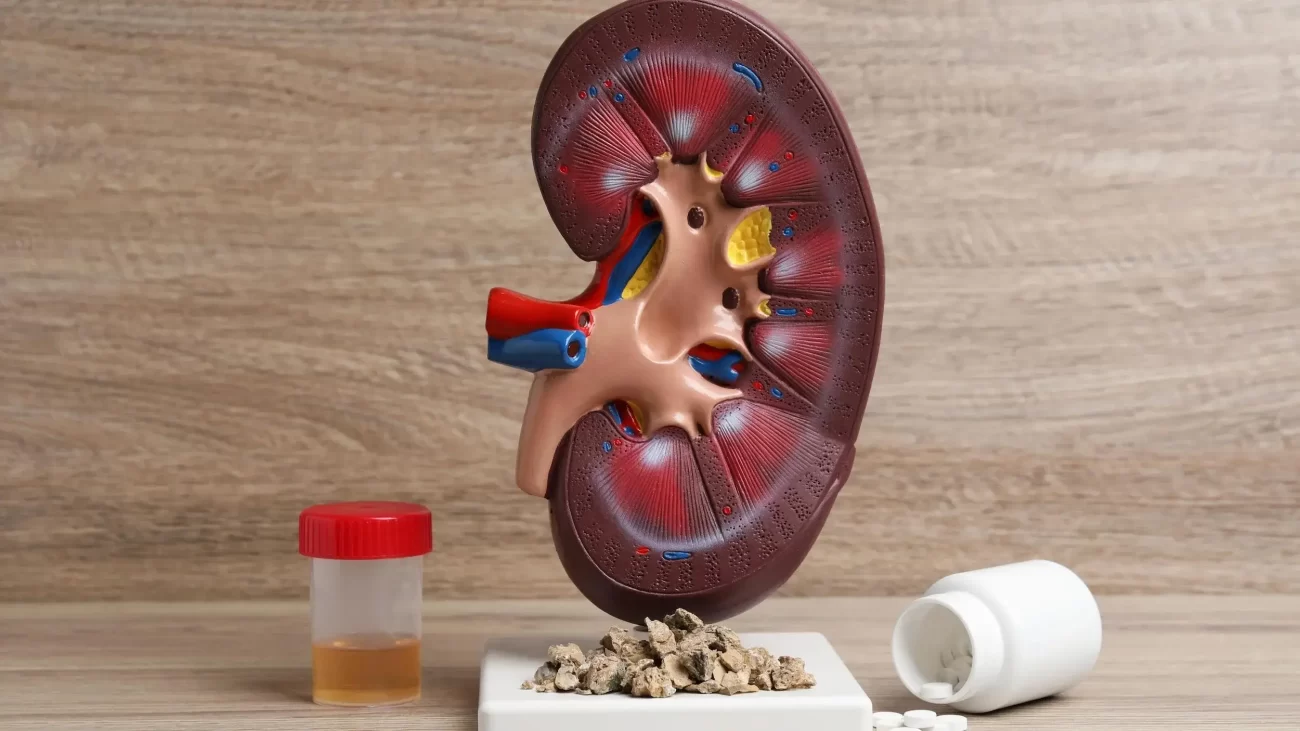Causes and Symptoms of Kidney Stones

Kidney stones form when certain substances in urine become concentrated and crystallize. Several factors contribute to their development:
- Inadequate Water Intake: Dehydration leads to concentrated urine, which increases the likelihood of stone formation.
- Family History of Kidney Stones: If a family member has had kidney stones, the risk is higher for other relatives.
- Dietary Habits: Consuming large amounts of protein, salt, or foods high in oxalates can promote stone formation.
- High Urinary Calcium: Elevated calcium levels in urine are a common cause of kidney stones.
- Obesity: Excess weight can disrupt metabolic processes and raise the risk of developing kidney stones.
- Certain Medical Conditions and Medications: Health problems like high blood pressure, diabetes, or Crohn’s disease, as well as some medications, may contribute to stone formation.
Symptoms of Kidney Stones
Small kidney stones may not cause noticeable symptoms, but larger ones can create significant discomfort when they move through the urinary tract. Common symptoms include:
- Severe Pain: Sharp pain in the side or lower abdomen, often occurring in waves.
- Blood in the Urine (Hematuria): Urine may appear pink, red, or brown.
- Frequent Urination and Burning Sensation: A strong urge to urinate, often accompanied by pain or discomfort.
- Nausea and Vomiting: The intense pain from kidney stones can lead to nausea and vomiting.
- Fever and Chills: If the stones cause an infection, fever and chills may occur.
Treatment Options for Kidney Stones
The treatment of kidney stones depends on their size, location, and the patient’s overall health. Small stones may pass naturally, while larger stones might require medical intervention. Common treatments include:
- Hydration: Drinking 2-3 liters of water daily can help flush out small stones naturally.
- Pain Relief and Medication: Painkillers may be prescribed to manage discomfort, along with medications to relax the urinary tract and ease stone passage.
- Extracorporeal Shock Wave Lithotripsy (ESWL): This procedure uses sound waves to break stones into smaller pieces, allowing them to pass through urine.
- Ureteroscopy: A thin tube is inserted through the ureter to locate the stone, which is then removed or broken using a laser.
- Percutaneous Nephrolithotomy: For larger stones, a small incision is made to remove them directly from the kidney.
- Open Surgery: Rarely needed, open surgery may be performed if other methods are ineffective or the stone is exceptionally large.
Prevention of Kidney Stones
Preventing kidney stones involves a combination of healthy lifestyle choices and dietary modifications. Here are some tips to reduce the risk:
- Drink Plenty of Water: Aim for 2-3 liters of water daily to keep urine diluted and prevent stone formation.
- Watch Your Diet: Limit the intake of oxalate-rich foods like spinach, beets, and almonds. Avoid excessive salt, which can raise calcium levels in urine.
- Maintain Calcium Balance: Ensure a balanced intake of calcium, but follow your doctor’s advice if taking supplements.
- Limit Animal Protein: High consumption of meat, poultry, and fish can increase acid levels in urine, promoting stone formation.
- Maintain a Healthy Weight: Obesity increases the risk of kidney stones, so focus on a balanced diet and regular exercise.
Conclusion
While kidney stones can be painful and disruptive, they are manageable with the right treatment and lifestyle changes. Drinking plenty of water, adopting a healthy diet, and having regular medical check-ups are key steps in preventing kidney stones. If you experience any symptoms, consult a healthcare professional promptly for early diagnosis and treatment.
Everything You Need to Know About Peyronie’s Disease (Penile Curvature) Treatment
